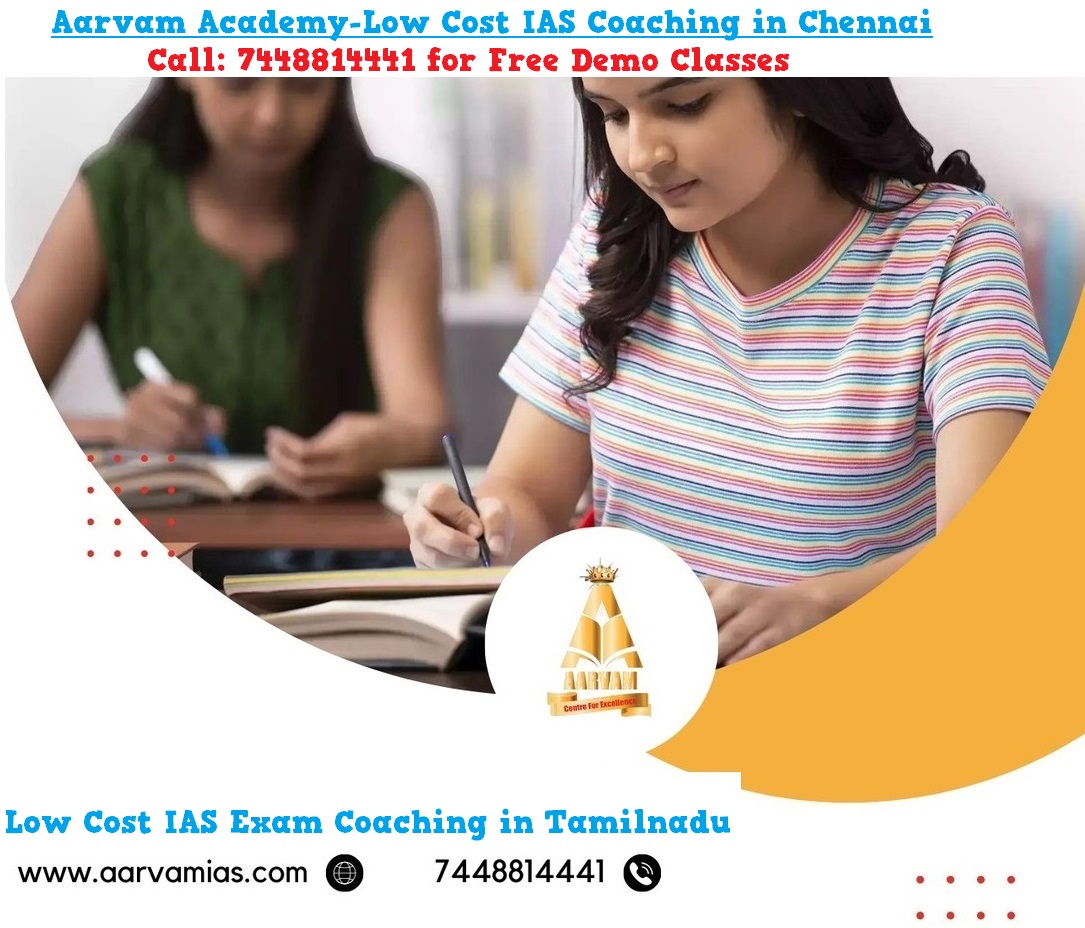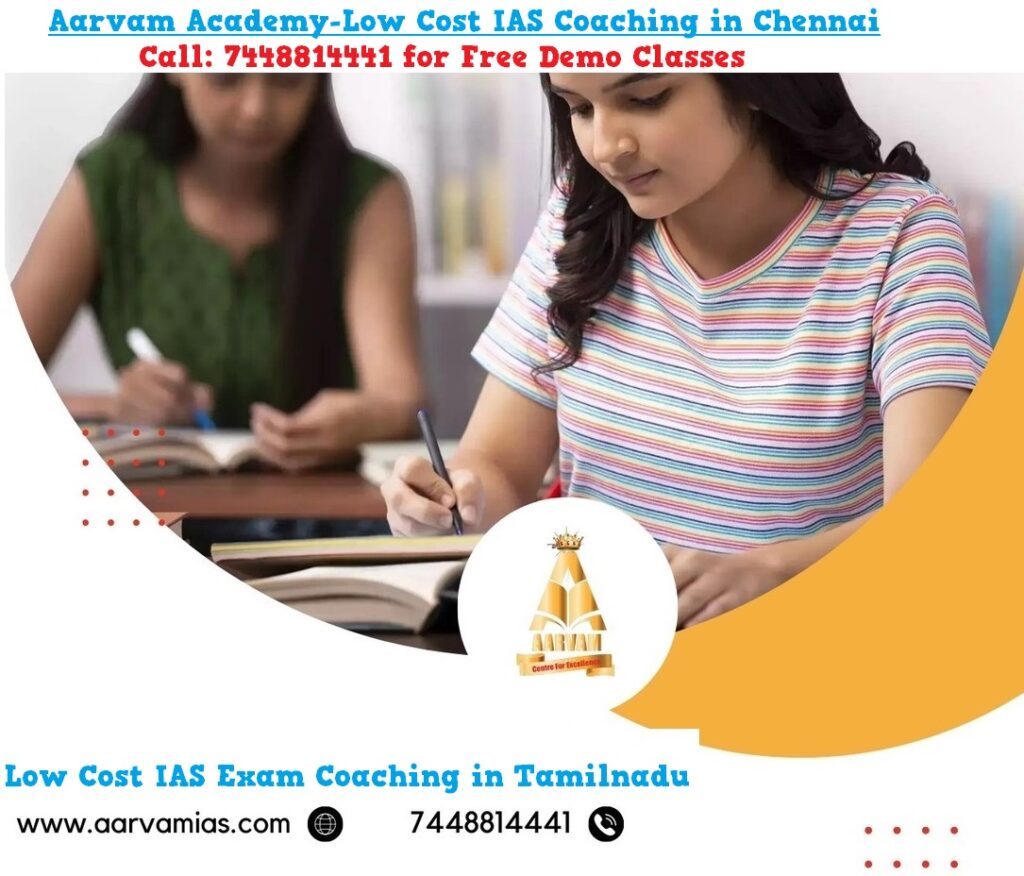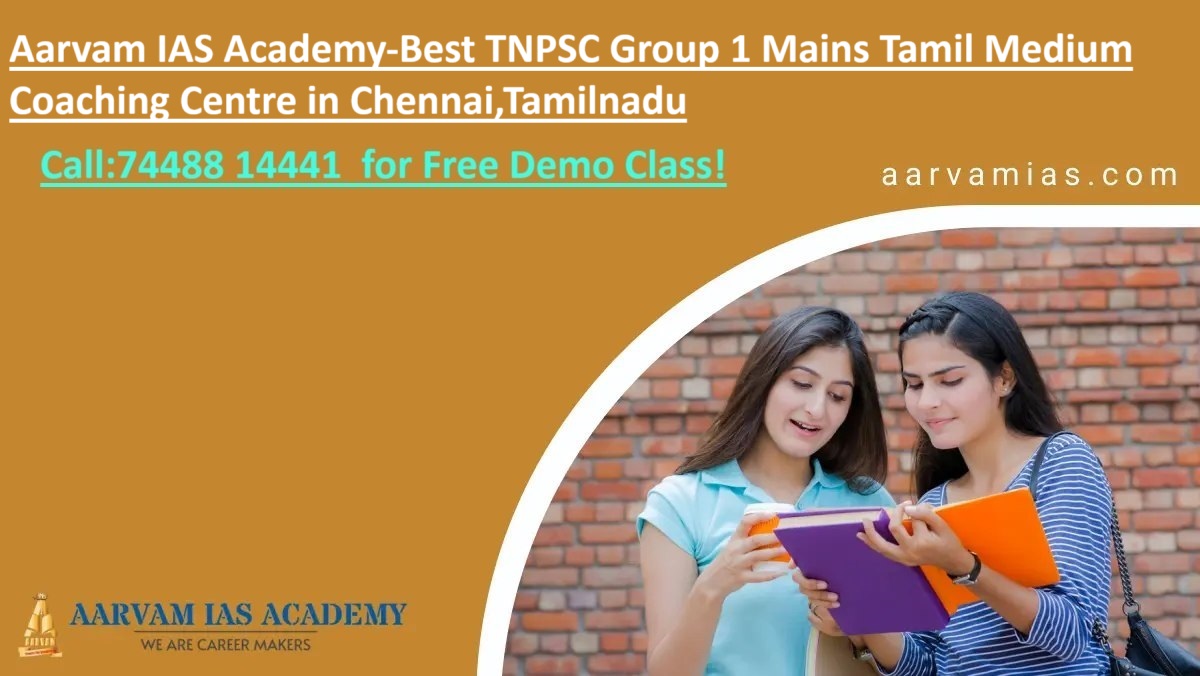
Aarvam Academy-Low Cost IAS Coaching in Chennai-Call: 7448814441 for Free Demo Classes.

Every year, thousands of aspiring civil servants strive to crack one of the toughest competitive exams in India – the Union Public Service Commission (UPSC) examinations. In their pursuit of achieving their dreams and becoming an Indian Administrative Service (IAS) officer, many candidates seek professional guidance from IAS coaching centers.When considering ias coaching centres,Aarvam Coaching Academy play a crucial role in imparting the necessary knowledge, guidance, and strategies to crack the UPSC exams. However, with numerous coaching centers claiming to be the best, it becomes imperative to compare and analyze them to make an informed choice.
In this article, we will discuss the factors that differentiate the Aarvam IAS coaching centers from the rest. By considering these factors, candidates can make a comparative analysis and identify the coaching center that suits their needs the best.
- Faculty: The quality of faculty is perhaps the most vital aspect of a coaching center. The Aarvam Coaching Academy have highly experienced and qualified faculty members who possess in-depth knowledge of the subjects. They are experts in their respective fields and can provide valuable insights and strategies for cracking the UPSC exams.
- Study Material: The availability of comprehensive and updated study material is crucial for effective preparation. Aarvam Coaching classes provide well-researched study material that covers all the necessary topics and concepts. They also include previous years’ question papers and mock tests to make the candidates familiar with the exam pattern.
- Infrastructure and Resources: A conducive learning environment is essential for effective preparation. The coaching centers with spacious classrooms, modern teaching aids, comfortable seating arrangements, and a well-stocked library create an atmosphere that promotes learning. Additionally, access to online resources, such as video lectures and online tests, can be an added advantage.
- Success Rate: One of the significant factors to consider while choosing an IAS coaching center is its track record of producing successful candidates. The Aarvam Coaching institute usually have a high success rate, which indicates their effectiveness in guiding students towards success.
- Personalized Attention: Each candidate has unique strengths and weaknesses.We provide personalized attention to the students, such as doubt-solving sessions, individual mentoring, and regular assessments, are often preferred. This tailored approach helps in addressing specific weaknesses and enhancing overall performance.
- Past Student Experiences: Feedback from past students can provide valuable insights into the coaching center’s teaching methodology, support system, faculty, and overall experience. Candidates can initially research online and then try to connect with individuals who have previously attended the coaching center to get an honest review.
By considering these factors and conducting a comparative analysis, candidates can narrow down the options and choose the best IAS coaching center that aligns with their preferences and requirements.
Aarvam Academy ,now offers IAS Coaching Demo Classes for Free ! Fewer number of Seats are Available.Call: 7448814441 to Avail your Seats Now!
IAS Preparation Syllabus
The Indian Administrative Service (IAS) examination is one of the most prestigious and competitive exams in India. Every year, lakhs of aspirants from all over the country appear for this exam with the dream of becoming a civil servant. However, the vast and ever-evolving syllabus can often be overwhelming for many candidates. In this article, we aim to demystify the IAS preparation syllabus and provide some guidance on how to unlock success in this challenging journey.
First and foremost, it is essential to understand the three stages of the IAS examination – the Preliminary Examination (Prelims), the Main Examination (Mains), and the Personality Test (Interview). Each stage has its syllabus and requires a different approach to preparation.
- Preliminary Examination (Prelims):
The Prelims consist of two objective-type papers – General Studies (GS) Paper I and CSAT (Civil Services Aptitude Test) Paper II. The GS paper covers topics like history, geography, polity, economy, science, and current affairs. It is crucial to have a strong foundation in these subjects. Reading newspapers, magazines, and standard reference books can help in staying updated with current affairs and gaining conceptual clarity.
The CSAT paper on the other hand, tests aptitude and reasoning skills. To excel in this section, regular practice of mock tests and solving previous years’ question papers is necessary. It is also important to focus on time management and accuracy while attempting these objective-type questions.
- Main Examination (Mains):
Mains is the most challenging stage of the IAS examination. It consists of nine subjective-type papers, out of which two are qualifying papers (English and an Indian language) and the rest are counted for merit. The GS papers cover a wide variety of subjects, including history, geography, polity, economics, environment, science, and technology. In addition, there are two optional papers chosen by the candidate.
To prepare for the Mains, one must delve deep into the subjects and develop a comprehensive understanding of the topics. Reading standard textbooks, reference books, and practicing answer writing are key. Analyzing previous years’ question papers and study materials provided by coaching institutes can give insights into the exam pattern and the type of questions asked. Additionally, it is crucial to revise the syllabus multiple times to retain the information.
- Personality Test (Interview):
After clearing the Mains stage, candidates who are shortlisted appear for the Personality Test (Interview). This stage assesses the candidate’s personality, communication skills, and overall awareness. There is no fixed syllabus for the interview stage, but having knowledge of the current affairs, general knowledge, and understanding of one’s own bio-data is crucial. Mock interviews and group discussions can also help in gaining confidence and improving communication skills.
Apart from the specific syllabus for each stage, there are some common aspects that candidates should keep in mind throughout their IAS preparation:
- Time management: Planning a study schedule and allocating specific time for each subject is important. Balancing the preparation for multiple subjects and stages can be challenging, so it is crucial to manage time effectively.
- Practice: Regularly solving mock tests, previous years’ question papers, and participating in test series can help in assessing one’s progress and improving performance. It also helps in understanding the exam pattern and time constraints.
- Current affairs: Staying updated with current affairs is a vital aspect of IAS preparation. Reading newspapers, magazines, and watching news channels can help in gaining knowledge about ongoing events and their impact on various subjects.
- Answer writing skills: Answer writing is an essential aspect of the Mains stage. Practicing answer writing, structuring the answers, and developing a coherent argument can significantly improve scores. Seeking feedback from mentors and seniors is also valuable.
- Revision: Regular revision is crucial to retain information and reinforce learning. Making short notes, flashcards, and mind maps can aid in revision.
Preparing for the IAS examination is a challenging and long-drawn process. It requires commitment, discipline, and a holistic approach. By understanding the syllabus and adopting an organized study plan, aspiring candidates can demystify the IAS preparation syllabus and unlock their path to success. Remember, success is not achieved overnight; it is the result of consistent efforts, perseverance, and a positive mindset. So, stay focused, work hard, and embrace the journey towards becoming an IAS officer.
Unlocking Success: Demystifying the IAS Preparation Syllabus










